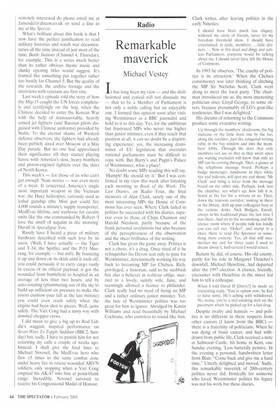Remarkable maverick
Michael Vestey
It has long been my view — and the disillusioned and cynical will not dissuade me — that to be a Member of Parliament is not only a noble calling but an enjoyable one. I formed this opinion soon after visiting Westminster as a BBC journalist and hold to it to this day. Yes, for the ambitious but frustrated MPs who never rise higher than junior minister, even if they reach that position at all, it can no doubt be a dispiriting experience; yes, the increasing dominance of EU legislation that overrules national parliaments must be difficult to cope with. But Barry's and Pugin's Palace of Westminster, what a place!
No doubt some MPs reading this will say, 'Humph! He should try it.' But I was confirmed in my view this week after listening each morning to Book of the Week: The Last Diaries, on Radio Four, the final memoirs of Alan Clark, surely one of the most interesting MPs the House of Commons has ever seen. Where Clark failed in politics he succeeded with his diaries, superior even to those of Chips Channon and Harold Nicolson, partly because of the frank personal revelations but also because of the perceptiveness of the observation and the sheer brilliance of the writing.
Clark has given the game away. Politics is not a chore, it's a drug. Once tired of it he relinquishes his Devon seat only to pine for Westminster, determinedly working his way back to becoming MP for Chelsea. Rich, privileged, a historian, said to be snobbish but also a believer in noblesse oblige, married to a lovely, saintly wife, Jane, and seemingly allowed a licence to philander, Clark really had no need of being an MP and a rather ordinary junior minister. Yet, the lure of Westminster politics was too great for him to ignore. Abridged by Katrin Williams and read beautifully by Michael Cochrane, who contrives to sound like him.
Clark writes, after leaving politics in the early Nineties:
I should have been much less cliquey, widened my circle of friends, never let my boredom threshold show. I should have entertained, in cycle, members little dinners , . , Now in this dead and dingy and aimless Parliament, everyone would be talking about me. I should never have left the House of Commons.
In 1993 he observes, The cruelty of politics is its attraction.' When the Chelsea constituency was later thinking of ditching the MP Sir Nicholas Scott, Clark went along to meet the local party. 'The chairman introduced me as, the most interesting politician since Lloyd George, to some titters, because presumably of LG's goat-like tendencies. But I was delighted.'
His dreams of returning to the Commons produce some evocative writing:
Up through the members' cloakroom, the big staircase or the little front one by the loo, alone the corridor, past the octagonal writing table in the bay window and into the members' Lobby. Through the door that only members can use so that as they swish open any waiting journalist will know that only an MP can be coming through. Then, a glance at the telephone message board. Perhaps a badge messenger, handsome in their white ties and tailcoats, will spot me and shout, 'Mr Clark' and bring a letter from the message board on the other side. Perhaps, look into the chamber, see what's up, how full it is. Stand at the bar for a minute or so. Then, down the tearoom corridor, looking in there or the Library, drift up past colleagues busy at the various desks. Nick Budgen, Enoch, always in his traditional place the Last time I was there. And on to the no-smoking and the silence room where if people talk too loudly you can call out, 'Order!', and slump in a chair, there to read The Spectator or something more esoteric. Yes, all that still mesmerises me and for three years I used to dream about it. half-certain I would return.
Return he did, of course. His old enemy, partly for his role in Margaret Thatcher's downfall, Michael Heseltine, had departed after the 1997 election. A chance, friendly, encounter with Heseltine in the street led him to tell a colleague,
When I told David D [Davis?' he made an interesting reply, 'You're opium now, he had to have some. He's aching with withdrawal. No, worse, you're a still-smoking stub on the pavement which he picked up for a Last drag.
Despite rivalry and hatreds — and politics is no different in these respects from other careers (I know from the BBC) — there is a fraternity of politicians. When he was dying of brain cancer, and had withdrawn from public life, Clark received a note at Saltwood Castle, his home in Kent, one Sunday evening, 'Less batterdly pensive. In the evening a personal, handwritten letter from Blair: "Come back and give me a hard time." Utterly delighted and moved.' Sadly, this remarkable maverick of 20th-century politics never did, Ironically for someone who loved Westminster politics his legacy was not his work but these diaries.


























































 Previous page
Previous page